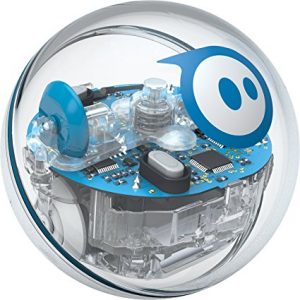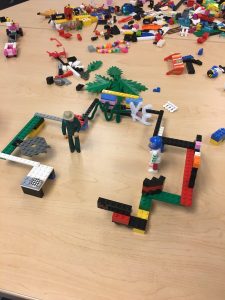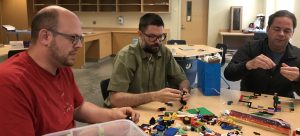Makerspace is an upcoming movement in the field of education. The goal of makerspace is to design a place for kids and students to create, play, and innovate. Johanna Prince, Director of Graduate Programs at UMF, has been involved in helping to educate the public about makerspace and potentially design a makerspace on campus. Johanna oversees the Masters in Technology program at UMF and has an interest in educational technology.
Makerspaces can be implemented and used in various ways. “I have seen makerspaces in kindergarten classes, art classrooms, high schools using high end, high-tech equipment,” said Johanna, “there’s a wide range in who can make use of them.” Makerspaces can consist of a fixed location to work in, mobile spaces in which items are transported to different locations on a cart, or even just a few shelves in a classroom with tools and resources designated for student innovation and creativity. Common tools and materials used are craft supplies, glue guns, small power tools, laser cutters, circuitry equipment, and much more!
3D printers are becoming increasingly popular as well, as people from various fields of study make use of them to design and create various tools. 3D printers can be used to create small or large items, math manipulatives, three-dimensional maps to study geography and landforms, and some assistive technology tools as well, such as a device to help turn a door handle or turn on a light switch. There is a 3D printer on campus at UMF, but it is not easily accessible to the public. If you are interested in making use of the 3D printer for educational and professional purposes, please contact Johanna Prince at johanna.prince@mane.edu
While there is not yet a dedicated Makerspace location on campus, there are various resources in the area that students and faculty can make use of. Everyone’s Resource Depot (located in the Education Center basement) has an abundance of craft materials and miscellaneous supplies at a very affordable price. The  Spenciner Curriculum Materials Center (located on the first floor of the Education Center) has a variety of materials as well, including new Sphero Robots (pictured left), which can be controlled by tilting, tapping, or swiping your smartphone. Interested in learning more about Sphero Robots? Come to an interactive session using Sphero robotics and block based coding to play and learn, no prior knowledge or experience needed! This workshop will take place on Saturday, October 21st from 9:00-12:00 in Education Center 012. Spaces are limited to 20 participants, so fill out the registration form soon to ensure your spot!
Spenciner Curriculum Materials Center (located on the first floor of the Education Center) has a variety of materials as well, including new Sphero Robots (pictured left), which can be controlled by tilting, tapping, or swiping your smartphone. Interested in learning more about Sphero Robots? Come to an interactive session using Sphero robotics and block based coding to play and learn, no prior knowledge or experience needed! This workshop will take place on Saturday, October 21st from 9:00-12:00 in Education Center 012. Spaces are limited to 20 participants, so fill out the registration form soon to ensure your spot!
Are you interested in makerspace, and want to learn more about it what you can do with it? There will be two more makerspace workshops and discussions after the Sphero robotics coding one workshop:
Low Tech and High Tech Making: Saturday October 28th 9:00-12:00 in Education Center 012
Join us for a hands on session to explore high tech and low tech making. You’ll get a chance to play with 3D modeling software, use a 3D printer, and create using low-tech repurposed materials. Limited to 20 participants, so fill out the registration form before it’s too late!
What space is needed for a makerspace?: Wednesday December 6th 11:45-1:00 in Education Center 012
In this conversation we will continue to explore the ideal of making, creating and innovating. We’ll discuss the ways we already have these spaces in our community and places, as well as how we can leverage them to develop spaces and opportunities for more making.
At the last workshop, What is a makerspace?, there was an open conversation about makerspaces, what the goal of a makerspace is, and creativity! There was also a discussion about high school students who use high-tech materials in school coming to UMF, which has less tech integration and innovative technology faculty than their high school experience. It was an interesting and interactive discussion, and some small materials were provided to build and manipulate with. Check out these creations!
the goal of a makerspace is, and creativity! There was also a discussion about high school students who use high-tech materials in school coming to UMF, which has less tech integration and innovative technology faculty than their high school experience. It was an interesting and interactive discussion, and some small materials were provided to build and manipulate with. Check out these creations!
If you have any additional questions about makerspace, contact Johanna Prince (johanna.prince@maine.edu), Kathryn Will-Dubyak (kathryn.willdubyak@maine.edu), or Bryce Cundick (bryce.cundick@maine.edu). Stay up to date with the Ed360 blog to learn more about makerspace opportunities!

